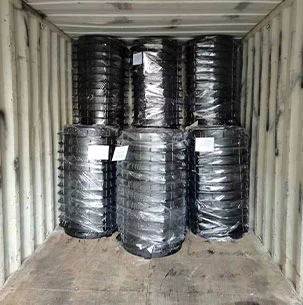
अगस्ट . 14, 2024 05:46 Back to list
Efficient Design and Operation of Coal-Fired Water Tube Boilers for Industrial Applications and Environmental Compliance
Coal-Fired Water Tube Boilers An Overview
Coal-fired water tube boilers are essential components in industrial and utility-scale power generation. They efficiently convert the thermal energy released from burning coal into steam, which can subsequently be used for electricity generation or heating applications. This article explores the operational principles, advantages, environmental considerations, and the future of coal-fired water tube boilers.
Operational Principles
At the core of a coal-fired water tube boiler is its design, which allows for efficient heat transfer. Unlike fire-tube boilers, where hot gases pass through tubes submerged in water, water tube boilers have the water contained in tubes that are exposed to hot gases. This arrangement significantly enhances the thermal efficiency and allows for higher pressures and temperatures.
The boiler operates by burning pulverized coal in the combustion chamber. The resulting hot gases flow through a series of water-filled tubes, heating the water within them to produce steam. This steam can reach temperatures exceeding 500 degrees Fahrenheit and pressures up to 2,000 pounds per square inch, making it suitable for various industrial applications.
Advantages of Coal-Fired Water Tube Boilers
One of the primary advantages of coal-fired water tube boilers is their ability to handle large loads. They can provide substantial amounts of steam for power generation, making them invaluable in large-scale electricity production. Additionally, their design is inherently more resilient to high pressure and temperature, allowing for greater efficiencies.
Coal remains one of the most abundant and cost-effective fossil fuels. This economic advantage means that coal-fired water tube boilers can be more competitive than other energy sources in terms of capital and operational costs. Moreover, advancements in technology have enabled these boilers to meet stringent efficiency and emission standards, thus becoming more environmentally friendly compared to earlier models.
coal fired water tube boiler

Environmental Considerations
Despite their advantages, coal-fired water tube boilers face significant scrutiny regarding their environmental impact. The combustion of coal produces greenhouse gases, primarily carbon dioxide, which contribute to climate change. Additionally, coal combustion can release pollutants such as sulfur dioxide, nitrogen oxides, and particulate matter, which can have detrimental effects on air quality and human health.
To mitigate these impacts, many modern coal-fired boilers incorporate advanced emissions control technologies, such as electrostatic precipitators and flue gas desulfurization systems. These technologies significantly reduce the emissions of harmful pollutants, making coal-fired water tube boilers more sustainable.
The Future of Coal-Fired Water Tube Boilers
The future of coal-fired water tube boilers is complex and influenced by various factors, including regulatory frameworks, economic conditions, and the global shift towards renewable energy sources. While some regions continue to invest in coal technology due to its reliability and cost-effectiveness, there is a growing trend towards cleaner alternatives, such as natural gas, wind, and solar power.
Nevertheless, for industries and regions heavily reliant on coal, innovations in clean coal technology and carbon capture and storage (CCS) may offer pathways for continued use of coal-fired water tube boilers. These technologies can help reduce the carbon footprint of coal-fired power generation, allowing for a more environmentally conscious approach while meeting energy demands.
Conclusion
Coal-fired water tube boilers will continue to play a significant role in energy generation, particularly in industrial applications. While they offer several advantages, including high efficiency and operational flexibility, the challenge of environmental impact cannot be overlooked. The future success of these systems will depend on continual advancements in technology and regulatory changes that prioritize sustainability and public health. As the energy landscape evolves, so too must the technologies that power our industries and communities.
-
Best Steam Boiler Design PDF Free Design Calculation & Diagram Downloads
NewsJun.10,2025
-
Hot Boiler Water Heater Efficient Heating Solutions for Home & Commercial Use
NewsJun.10,2025
-
Steam Boiler Safety Devices High-Quality Protection Valves
NewsJun.10,2025
-
Ultimate Steam Boiler Checklist for Safety & Efficiency
NewsJun.10,2025
-
Optimal Hot Water Boiler Temperature Setting Guide
NewsJun.10,2025
-
Effective Hot Water Boiler Chemical Treatment Protect & Maintain
NewsJun.09,2025
Related PRODUCTS






















